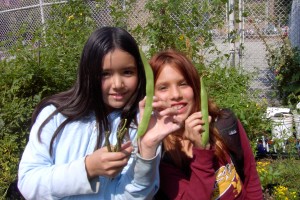School Food Gardens in Multicultural Inner-city Settings

Originally appears in the Winter 2008-2009 issue
Multifaceted, deep, and rich with learning possibilities, the relationship between people and plants goes to the source of our existence on the planet. Thomas Dewey, the famed educator, once said, “All you really need for education is a library and a garden.” Yet working school food gardens are certainly much rarer than libraries.
Food gardening provides many opportunities for student engagement, from planting to harvesting (think lifecycles, from seed to seed), with composting (nutrient cycles) and healthy eating in between. Food gardens can help to address concerns about children’s diets; about community access to locally grown produce; and about a variety of environmental issues, from pesticide use to greenhouse gas emissions.
This content is restricted to subscribers only.
If you are not yet a subscriber, please consider taking out a subscription here.
If you are an existing subscriber, kindly log in or contact us at info@greenteacher.com for more information.





